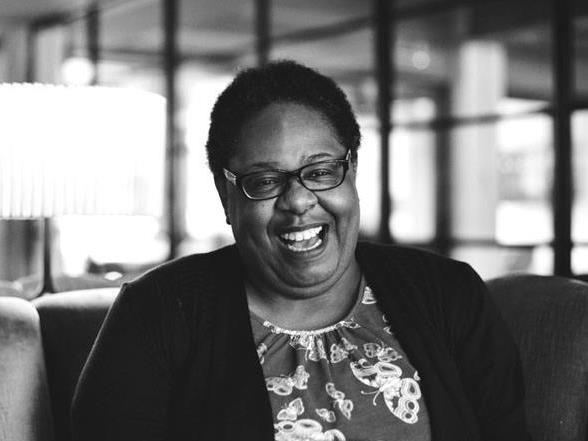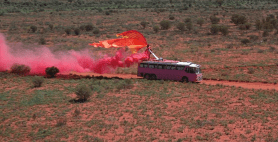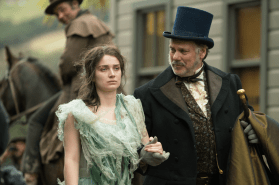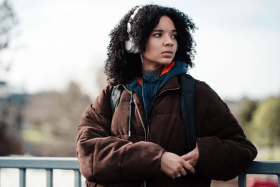Image: Deborah Williams
Why is the screen sector, and the arts in general, going into bat for diversity? We all share soft ideas about social justice, we are open to interesting stories and characters, and we want more fun in our workplaces.
In the back of our minds we know this is tokenism and that a truly diverse community looks really different. We also know that we are likely to make our audiences uncomfortable. These topics are dynamite as we know from the current revelations about sex and power. We start with the vicious Harvey Weinstein and we end up grappling with our fallen heroes. Comedians, gardeners, lovers and leaders are falling like ninepins.
Deborah Williams was brought to Screen Forever 2017 by the Australian Film Television and Radio School to discuss this wounded, charged terrain. She is the CEO of the Creative Diversity Network, which is funded by the UK television broadcasters to develop a truly diverse media.
She is charismatic, funny, wise and clear. She has an exquisite, nuanced voice which echoes with her family experience of Jamaica and the British Empire. She lives the contradictions of our brutal history.
From the 1980’s she worked in theatre as actor, maker, manager and producer, always close to disability and diversity politics. She moved to the Arts Council England to develop and implement the Creative Case for Diversity, and then to the British Film Institute as Diversity Manager to develop strategies like its three tick system, which covers the £1m lottery fund.
Doing the intersectional dance
‘I try to have the conversation from the intersectional perspective,’ she said in our discussion, ‘which is that class is an issue for education, and economic poverty is real, but – from a UK perspective – working class white boys are undereducated but they are overemployed and whilst middle class black boys are overeducated they are underemployed.’
Race, class and education are in multidimensional orbit around each other, and we are learning how to explore the tricky connections. Class is seen as a stable social identity, while money helps to drive social movement, but class barriers can make social movement pointless.
‘One of the things I am trying to look at now is what we mean by economic poverty. People don’t like it because it is far too prescriptive so they talk about class.’
When we look at the economics of being a member of an Indigenous or migrant community in Australia, she noted, that is effectively about class – because the observers are using that framework to define them.
‘That is a representation based on someone else’s theory and understanding of what you should be, not who you are. And media is full of people like that, full of that sort of thinking. And full of that sort of understanding and very little will to change that.
‘A lot of groups end up being represented in a sort of scripted reality and reality genre which is slightly patronising, slightly looking down your noses at particular communities in all sorts of ways and cultures which is where class is a real divide.
‘And I think that is globally. Television has become the bastard child of itself in how it represents people in different class groupings really.’
Deeper than social justice
You are not approaching this as a social justice issue?
‘No, but I did for a long time.’ Her understanding evolved as she became an artist and a creator, managing her own production company and working in the public sector and then with commercial companies.
‘It’s deeper than that. if you do that, you are still othering it, you are still keeping it outside of the core. Our culture and our creativity is the core of who we are as people. It’s in the human race to create. Everybody has a right to that. And that’s something we miss.’ We are not talking about fairness but self-existence.
She was friends with Naseem Khan, a pioneering activist and thinker about the role of culture in multicultural society who wrote a key report in 1976, The Arts Britain Denies. Migrants of colour from the former imperial possessions were being stripped of their own cultures, and turned into replicas of Anglo society.
In Willam’s words, ‘When you deny the voice of people’s culture and their understanding of who they are you are creating a rod for your back that will take a heck of a long time to mend and fix. If you force these people into the idea that your monocultural homogenous culture is it, you are destroying yourself and you are destroying your communities. And you are destroying our countries.’
Who gets to be the cliche
The process of othering is central to the power relations that sustain a monocultural, hierarchical system. A middle class Anglo elite gets to define who everyone else is. They are projections, cliches, stereotypes, unable to act for themselves with full autonomy. On the bottom, looking up, you learn what you are, defined by the culture delivered at you. Politically our system is sustained as a controlling apparatus. Artistically, we don’t have the ability to define characters in all their richness. The polite word is archetypes or stock roles.
‘All I can do now, is encourage people to start thinking about what does it really look like, not what is imagined, or what you have been told, but what does it really look like. When you open your front door what do you see? Which is why I go back to the idea that white stories are just as important as anyone else’s stories and straight stories and non disabled stories and male stories are just as important because diversity sits within that as well.
‘And diversity sits within everywhere and all of us, and as soon as we understand that, it becomes something completely different. And it becomes a joyous thing. That when you are writing in a room full of people that think differently to you and have different experience to you its great. It heightens the creativity, it heightens the idea that you want this to be brilliant and fantastic.
‘When I see people working in television looking so fucking miserable, I go “Huh, how can you not enjoy your job when you are making television programs?” Clearly something is wrong.’
The monster in the mirror
A huge part of the problem is a social process called mirroring. Communities and organisations can be built from people who resemble and reinforce each other. In the media, we assume that both the characters we create and the audiences we entertain share our values. It’s a bubble, outside which people are othered and exoticised.
It turns out we can be pretty good at bringing in new people. We like romantic outsiders, we like decorative people, but we impose one dreadful condition. They have to learn to be like us. Londoners can vote Sadiq Khan as mayor, and he can even be a Muslim, but he has to be a Londoner.
Williams has a lot of experience in dealing with this. ’Smashing the mirror isn’t going to work. You break it down bit by bit. Because you need to take people with you.
‘Keep it simple, keep it open, keep it honest, be generous. It’s all you’ve got and people will gravitate to you if they understand what you are doing – and they will move away from you if they don’t and you must be careful of that.’
Enough to be ourselves?
Does that mean we are encouraging people to be authentic?
‘I struggle with that word. For me, when people use that word I accept they are on their journey to somewhere else, which for me is reality. My company is called Reality Productions. For me authenticity is the reality of a lived experience. And again, lived experience is something I am beginning to hate because people have found ways to mirror that into what they think a lived experience is.
‘In the best sense in this context authenticity is just building three dimensional characters in a three dimensional world. In its worst sense it is tokenism. I will find one of everything and put them in a room and that will be authentic and have one line or one storyline or one opinion and that’s authenticity.
‘Imagining that groups that are othered, that are marginalised, that are under-represented are homogenous and just taking strands – that is authenticity in its worst form. In its best, its about the complexity that we are as people, presented through a different lens and a different understanding.’
Why our sectors are so middle class
The trends and pressures inside Australian and UK television are similar, as we deal with government cuts, the demon of austerity and governments that float away from the common consensus of their people. So there is a lot to learn from the British experience although the solutions are quite different.
One of the common problems is the way in which aspirants to work in media need family resources to develop a career. It’s an intersection between class and economics.
‘My background is in the arts, in theatre, where everyone is poor,’ said Williams. ‘When you come into television and film there’s a huge economic gap.’
Think about the long working days and the unpaid labour to develop projects. People need secure housing, partners with incomes, the manners and style of a middle class education, the resources to support children. The pressure is not actually necessary, but it has grown because we have enough aspirants and creatives who can do it.
‘There are groups of people who can’t do that, who don’t have that. And that is a real issue. Because they are the people who are probably going to have stories and sensibilities and transferable skills that you people will never, ever have because you’ve never had to really work, fundamentally, and know what working is.
‘Especially in the UK for the last seven years having to pay nine thousand pounds a year for higher education, the idea being that you come out and you are far more employable as long as you’ve got a degree. And then suddenly saying, for example, to teachers that your degree is worth nothing if its not a 2.1 so you are suddenly having to work over hard and pay for the idea that even if you do come out with a degree you still cant get employment – and you are still not worth anything.
The sector is dying inside
‘In the creative cultural industries you are having to pay a lot of money for courses that aren’t necessarily teaching you the craft and craft is disappearing. The craft of filmmaking. The craft of writing, of directing, are disappearing and what comes with that? If you can afford it you can do it and that has become startlingly clear over the last five years, If you can’t afford it, tough luck.
‘’And that really is the creative void around talent, around development, around ideas, around the business of the industry and how it could grow and really develop.
How do you know there is a void developing?
‘What I see on television, the rooms I go into, the people I talk to, the conversations around what talent is, which I think is really interesting.
‘For example, there are two schools and if you don’t get into the schools and do the training, and graduate from them, then how could you possibly make television? If you have not had experience in a particular genre why would we want to work with you? The segregation is becoming wider and wider and wider.
‘The biggest thing for me is the lack of understanding around transferable skills. The industry says it can’t find a writer who is black and I can put them in touch with thirty of them. Some have never written television, some have written small bits but they write plays, they write big shows and they have won awards. But they haven’t done television so they are not wanted.
‘And that is the void – they employ this white person who’s written a couple of things for television and they think it’s fine. He’ll be able to tell the story and we’ll do some research and that’s what researchers are for.’
Like many older creative people in both Australia and the UK, Williams was able to develop her craft and voice on the dole, or working in relatively well paid part time jobs.
‘You do not have the capacity to do that any more, and especially in television. If you want to be a writer or a director in TV there is the expectation that you come in fully formed. Because the development and programs and gateway projects and pathways have all been closed or disappeared. There may be financial reasons, or because of mirroring. We’ve got the groups we need so we can just replicate and replicate and replicate and duplicate what we are doing.
Breaking down barriers
‘We don’t need to bring anyone else in so great big walls have been built up. The work I am doing and the membership [the broadcasters] have asked me to identify some of those walls and figure out how to take them down. And to do it – this is me talking – in a way that doesn’t diminish or undermine the work that has been done.’
Meanwhile, the monolith of television itself is under pressure, from digital delivery and the fragmentation of audiences.
‘In the UK, and I think globally, we are seeing the notion that you can make your own space to tell your own stories. So the online and digital space and the ease with which so many people can do that is beginning to shift that balance. It’s got a long way to go but I think it’s beginning to shift that balance.’
Deborah Williams is an empathetic communicator, who makes you feel special, and engages with you on your terms. But she makes me realise that the processes she combats are acts of violence. Cultural suppression is evil and degrading. Being othered attacks your autonomy and your internal architecture. Mirroring creates hopeless, and makes us into that old, appalling image – the organ grinder’s monkey. She describes some of the ways we engage with ‘minorities’ as ‘throwing them a bone.’
‘Some of the things I want to do and think about and talk about is that nobody should be grateful. If you are being grateful you haven’t got the job on your merits. You’ve got the job because of someone else’s pity. So why be grateful for it?
‘And be your best self, not your worst self – or what somebody else thinks you should be.’
——-
Here is an illuminating and personal article about diversity and audience.





